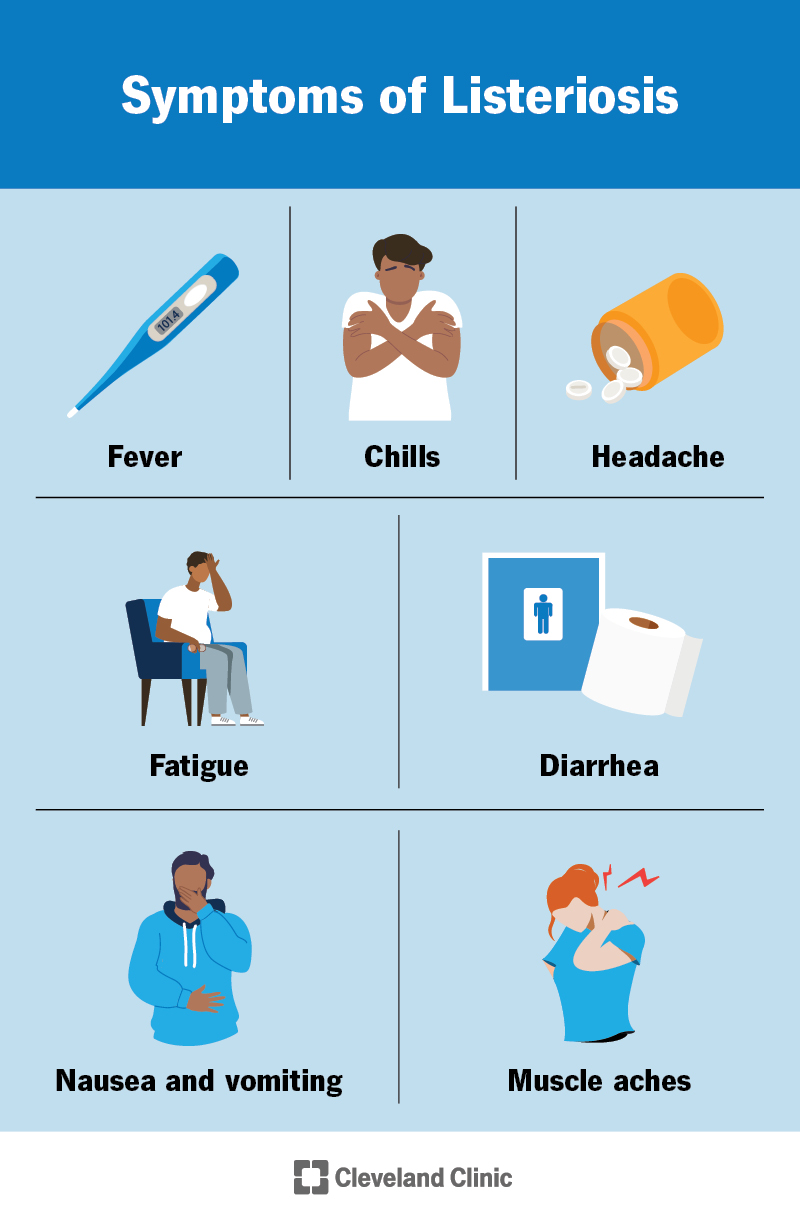Listeriosis is an illness you can get from eating something contaminated with Listeria bacteria. Foods that can contain Listeria include deli meats, hot dogs, and soft cheeses. Common symptoms include fever, headache and diarrhea. Listeria can be dangerous if you’re pregnant or have a weakened immune system. It’s treatable with antibiotics.
Advertisement
Cleveland Clinic is a non-profit academic medical center. Advertising on our site helps support our mission. We do not endorse non-Cleveland Clinic products or services. Policy
Listeriosis is a form of food poisoning you get from the bacteria Listeria monocytogenes. Many people refer to this bacterial infection as just “Listeria.”
Advertisement
Cleveland Clinic is a non-profit academic medical center. Advertising on our site helps support our mission. We do not endorse non-Cleveland Clinic products or services. Policy
For many people, a Listeria infection causes mild symptoms like a fever, headache, diarrhea or vomiting. But if you have a weakened immune system or are over 65, you’re at higher risk for life-threatening complications. If you’re pregnant, the infection can pass to the fetus during pregnancy or at birth (vertical transmission). This can cause pregnancy loss or serious, life-long health issues for your child.

Image content: This image is available to view online.
View image online (https://my.clevelandclinic.org/-/scassets/Images/org/health/articles/17721-listeriosis)
Listeriosis symptoms include:
You might not have all these symptoms. If Listeria spreads beyond your digestive system (invasive listeriosis), you might have additional, severe symptoms. These include:
Symptoms of listeriosis can start a few days to two weeks after eating contaminated food. If you’re pregnant, you might have mild or no symptoms but can still pass the infection to the fetus.
The bacteria Listeria monocytogenes causes listeriosis. You get it by eating or drinking something contaminated with the bacteria. If you’re pregnant and get a Listeria infection, you can transmit it to the fetus during pregnancy or childbirth.
Foods that are more likely to be contaminated with Listeria include:
Advertisement
No, Listeria infections aren’t contagious — they don’t spread to people around you.
You have a higher risk of getting severely ill or dying from listeriosis if you’re:
Listeria can spread from your digestive tract to other parts of your body. This can cause serious complications, including:
If you’re born with listeriosis or if you get an infection that spreads to your brain or causes sepsis, you could have long-lasting health conditions. These include:
You won’t know for sure if you have listeriosis unless you get tested. Many people don’t get tested if their symptoms are mild.
A healthcare provider might suspect you have listeriosis based on your symptoms and whether you’ve eaten something that could’ve been contaminated. They can confirm a diagnosis by testing your blood, fluid around your brain and spinal cord (cerebrospinal fluid), or amniotic fluid (if you’re pregnant) for signs of the bacteria.
Other tests might include:
Antibiotics like sulfamethoxazole and ampicillin treat listeriosis. Take your full course of medication as prescribed by your healthcare provider, even if you start to feel better. If you don’t take antibiotics as prescribed, the infection can come back.
If you have mild symptoms and aren’t pregnant or at risk for serious complications, you might not need treatment.
Call your healthcare provider if:
Advertisement
Ask your provider how to take any medications they prescribe and what to do if you miss a dose.
Yes, if you have a healthy immune system and aren’t pregnant, you’ll usually feel better in a couple of days without treatment. But if you’re pregnant or have risk factors for serious illness, talk to a healthcare provider right away. About 1 in 6 people with invasive listeriosis die.
You can manage the symptoms of listeriosis by resting and drinking lots of fluids. Avoid alcohol and caffeine, as they can make diarrhea worse. Over-the-counter medications might help relieve some symptoms. Talk to your child’s healthcare provider before giving them medications to make sure they’re safe.
You can reduce your risk of a Listeria infection by following food safety guidelines:
Advertisement
Yes, heating foods to the proper temperature kills Listeria.
For most people, food poisoning can make you miserable for a day or two. But sometimes, bacteria like Listeria can cause serious health issues. If you have a compromised immune system or are pregnant, pay attention to food recalls and talk to your provider about how to protect yourself from contaminated foods.
Advertisement

Sign up for our Health Essentials emails for expert guidance on nutrition, fitness, sleep, skin care and more.
Learn more about the Health Library and our editorial process.
Cleveland Clinic’s health articles are based on evidence-backed information and review by medical professionals to ensure accuracy, reliability and up-to-date clinical standards.
Cleveland Clinic’s health articles are based on evidence-backed information and review by medical professionals to ensure accuracy, reliability and up-to-date clinical standards.
Have a virus, fungus or bacteria? Some of these “bugs” won’t go away on their own. Cleveland Clinic’s infectious disease experts are here to help.
